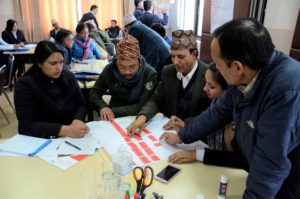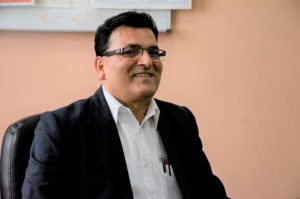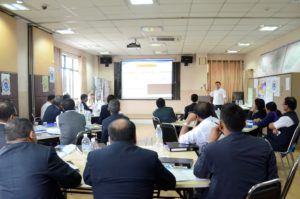Surya Prasad Aryal, Under Secretary of the Election Commission, Nepal (ECN) as well as Head of the Electoral Education and Information Centre, is a key player in the capacity-building endeavors of the Election Commission, Nepal (ECN).
After joining the civil service 20 years ago, Aryal plays a pivotal role in helping sensitize the ECN staff as well as other electoral stakeholders. He was actively involved in training and voter education activities in the 2013 and 2017 elections in Nepal through capacity development programmes, which include trainings for people with disabilities, trainings for social studies teachers, supporting the update of the social studies curriculum in the school textbooks, and also through a unique programme that addresses issues related to elections, governance and democracy.
This is called the Building Resources in Democracy, Governance and Elections (BRIDGE), developed by a global partnership of election assistance providers, including the Australian Electoral Commission (AEC), the International Foundation for Electoral Systems (IFES), the International Institute of Democracy and Electoral Assistance (International IDEA), the United Nations Development Program (UNDP) and the United Nations Electoral Assistance Division (UNEAD). BRIDGE is one of the of UNDP electoral assistance worldwide and is an important element of UNDP Nepal’s Electoral Support Project (UNDP/ESP) in capacity-building activities intended to ECN staff.
Being engaged with BRIDGE since its inception in 2008, Surya Aryal has reached the highest level of a facilitator as he became an accrediting-level facilitator and is, as such, able to accredit other BRIDGE facilitators. There are only five accrediting-level BRIDGE facilitators in Nepal. BRIDGE workshops, being very comprehensive on democracy and governance, are used to meet the needs of the diverse stakeholders in electoral processes, owing to its flexibility and adaptability to the local context. BRIDGE is therefore used as a tool within a broader capacity development framework and addresses a wide range of topics such as “Introduction to Electoral Administration,” “Disabilities and Elections,” “Voter and Civic Education,” “Gender Equality in Elections,” among others.
Aryal reflects that BRIDGE started being implemented in Nepal when the Constitution Assembly (CA) Elections of 2008 had been completed. This election was vital for Nepal and received a lot of international attention as the country had recently concluded the peace process. He explains, “The United Nations had provided support during the CA elections of 2008. A BRIDGE showcase was arranged for the ECN, and the Commissioners at that time felt that Nepal would benefit from BRIDGE as it encompassed a vast array of knowledge on democracy, governance and elections from across the globe.” Therefore, following a joint International IDEA, IFES and UNDP needs assessment mission in 2007, ECN adopted the BRIDGE professional development course.
UNDP through the Electoral Support Project (ESP) has been partnering with IFES and IDEA to introduce and implement BRIDGE in Nepal. As of 2018, 1882 (545 women, 1337 men) participants have been engaged in the BRIDGE programme. Aryal says, “BRIDGE is like a value-addition to our knowledge on elections and democracy. It has helped expose us to the issues in governance and democracy around the world.” He noted “a general increased capacity on part of the staff after being engaged with BRIDGE – the fact that we completed all three tiers of the 2017 elections within a year is a strong indicator of this!”
The evaluation of the impact of BRIDGE programme in Nepal that conducted in 2018 revealed that BRIDGE has made a significant contribution to the ECN’s human resource development. Based on the statements of respondents, BRIDGE has played an important role in sharpening their abilities, broadening their perspectives, building confidence, increasing competencies, and changing mindsets.
The Electoral Support Project- Phase II (ESP) is a technical assistance initiative which focuses on a long-term institutional and professional capacity development of the Election Commission (ECN) for conducting credible, inclusive and transparent elections. The objectives of the project are 1) to strengthen the capacity of the ECN to function as an independent and credible institution, 2) to allow the conduct of the election cycle in an effective, sustainable, and credible manner, and 3) to increase democratic participation, particularly for under-represented and disadvantaged segments of the Nepali society. ESP is currently funded by EU.



